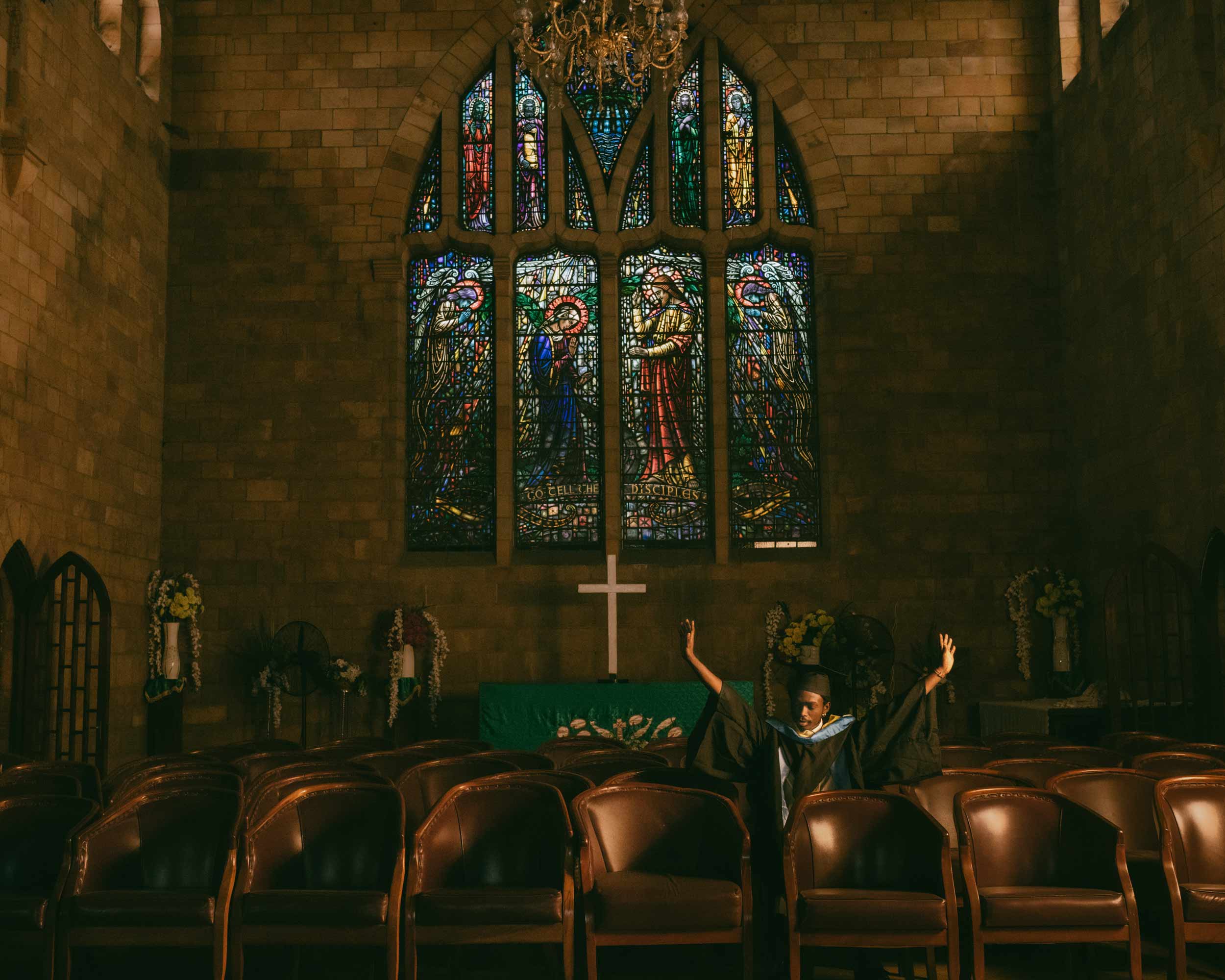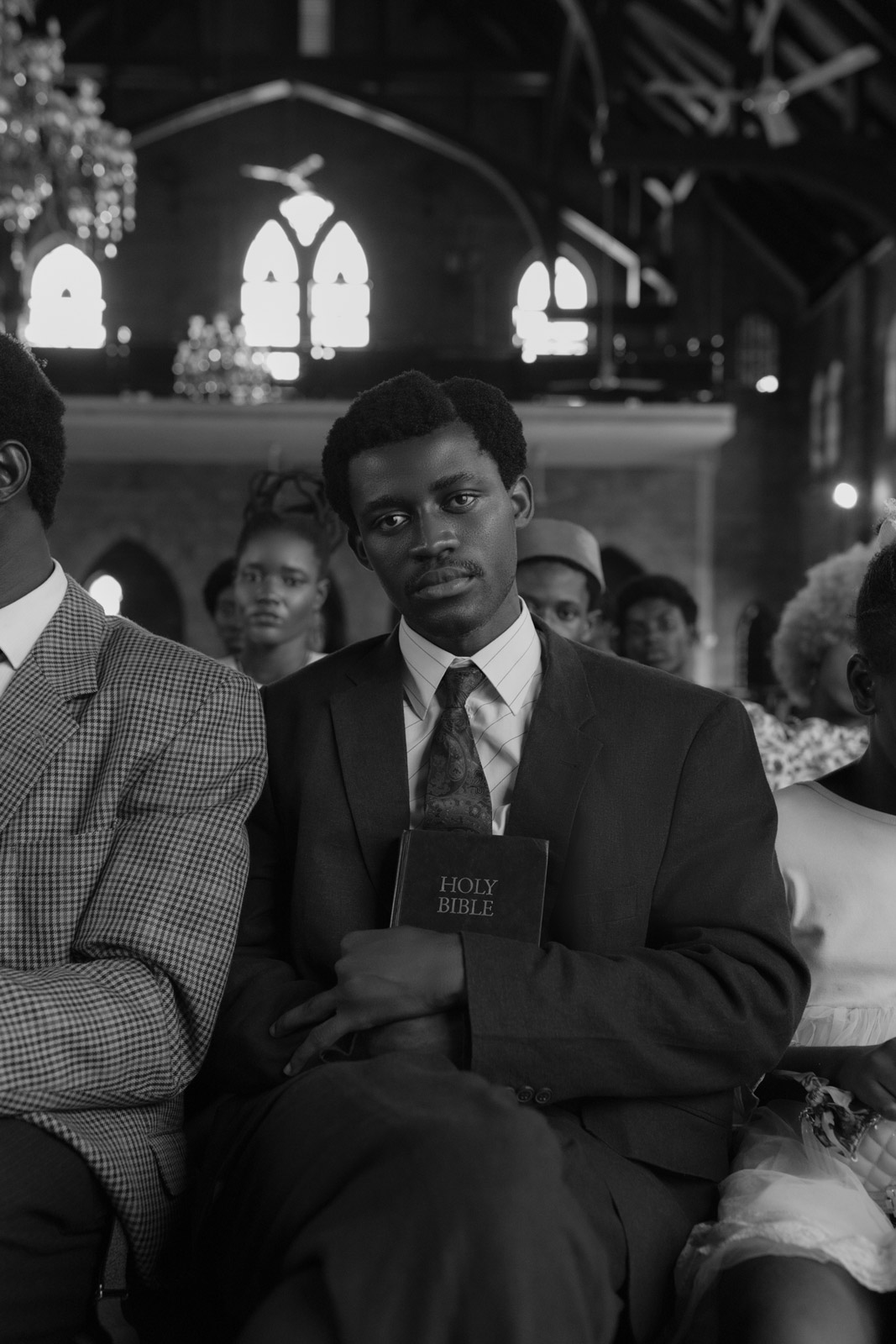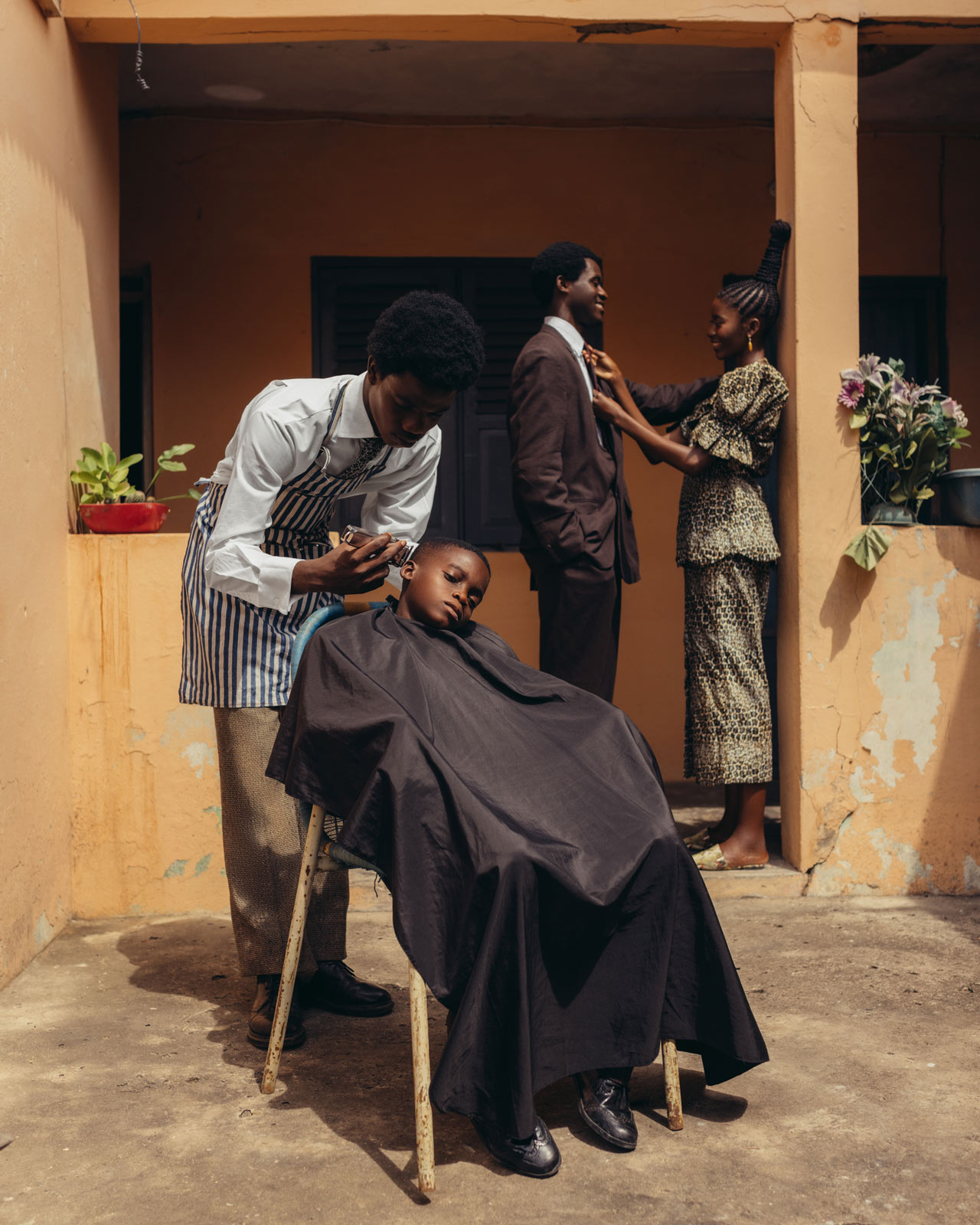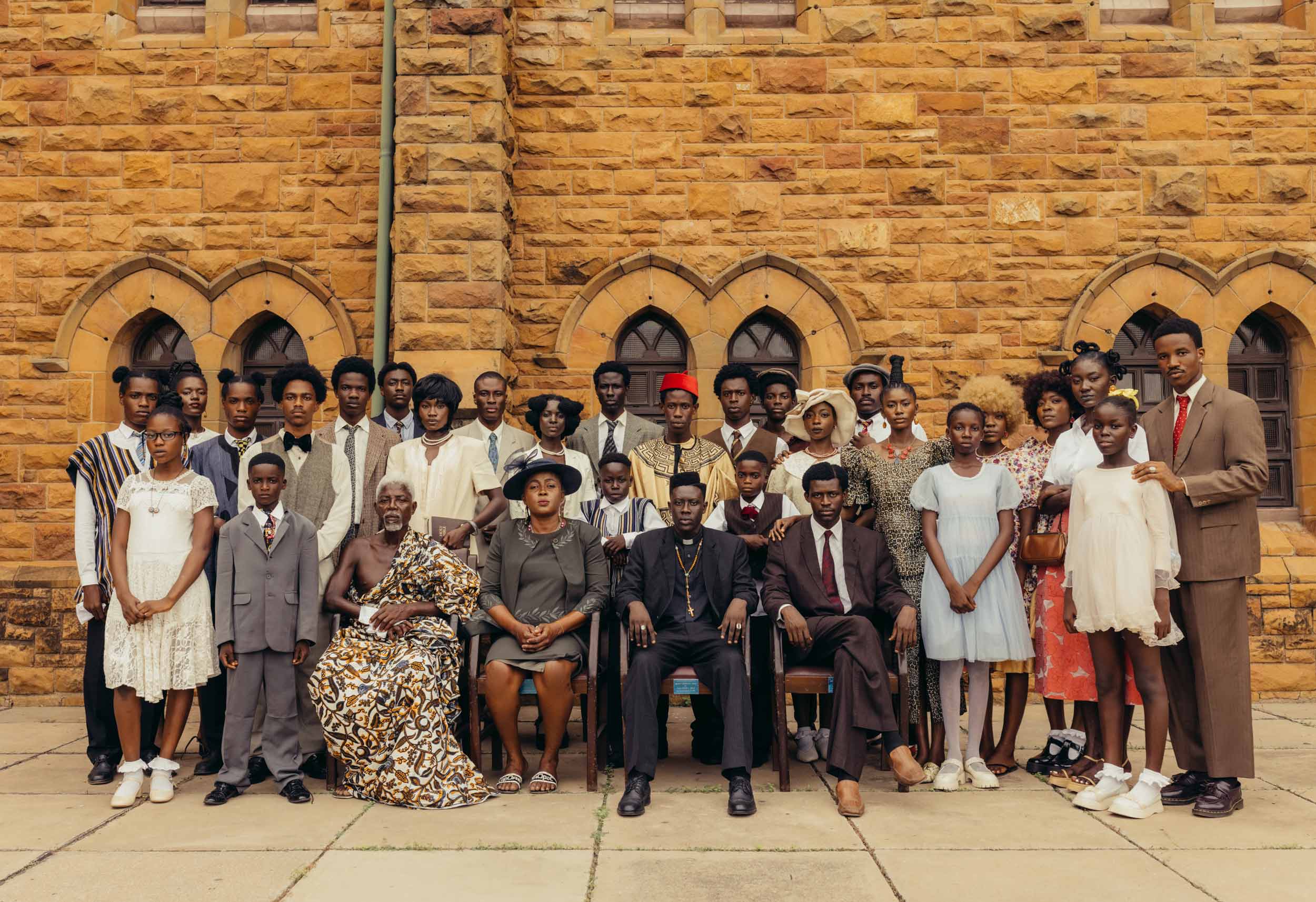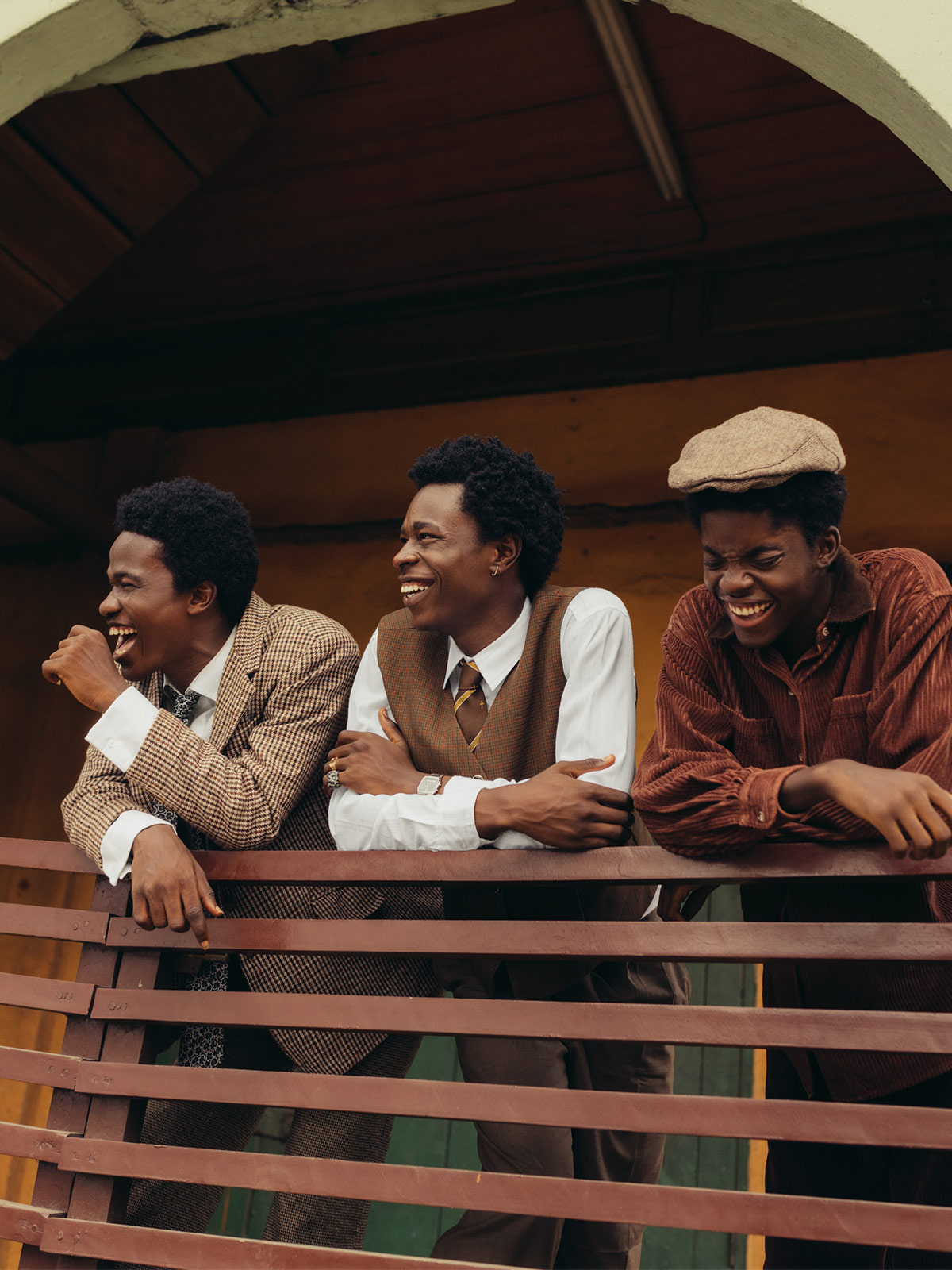The photographer’s ‘Sunday Special’ series blurs memory with fiction in staged recollections along the coast of Ghana
Walking through his childhood home in Takoradi, flipping through the pages of a photo album, watching the evening sky surrender to night—Carlos Idun-Tawiah often finds himself reunited with moments from his boyhood. Venturing into the vast memory palace that stretches across the coast of Ghana, Sunday Special is a tribute to adolescent days spent at church. It’s also an exercise in blurring memoir with fiction: Idun-Tawiah’s images are staged recreations of nostalgic recollections, populated by streetcast models posing as his parents, his grandmother, even himself.
As much as it is an experiment in visual autofiction, the project doubles as an intimate tribute to the history of Black vernacular image-making; fellow Ghanaian photographers James Barnor and Felicia Abban are cited by Idun-Tawiah as significant influences. One can see the former’s legacy in Sunday Special’s vibrant hues—Barnor established the nation’s first color processing lab in the early-’70s—and the latter’s in the series’s poised studio portraits. These visual homages dilate the scope of sentimentality captured in each frame. Idun-Tawiah’s work is not just a memoir, but an entry into the canon.
In this union of personal memory and archival images, the rich textures, postures, and shades of bygone church days are restored. To be shown for the first time later this summer—alongside other OpenWalls awardees in Arles, France—Sunday Special contains a stratum of stories, each imbued with its own depth and radiance.
Olivia Treynor: Tell me about yourself and this project, Sunday Special.
Carlos Idun-Tawiah: I was born in Takoradi, but I moved to Accra when I was about 14. That was right around the time I started photography. I’m self-taught. I had different interactions with the camera prior—with my dad’s, at home, and going to church with all these photographers. The experience of getting your photograph taken and having to fill the family album with my mom [was] a way of rekindling conversations. That’s what inspired this project.
I think I had a very rich childhood, in terms of experiences. My family wasn’t nuclear. We grew up in an extended set of sorts, with my grandmother, my uncles, my aunties. I was around all these different personalities. [Sunday Special] is a requiem of that childhood, those memories. I was inspired by the family album [and] by my recollections growing up Ghanaian in a Christian home. I tried to highlight the ethos of Sundays from a vernacular perspective—playing with nostalgia and juxtaposing images that had already been created. Finding a way of fictionalizing reality, with color, with texture, to fully extract the tenor of the day as far back as I could remember.
With this project, I wanted to find a balance between community and sanctity, where humanity and divinity could exist all in one frame. I tried to take people back in time, to inspire that sense of the nostalgic, to remember their families and their upbringings.
Olivia: To make these images, you had to unearth a lot of personal memories, especially from childhood. How did you go about accessing them? How did it affect you?
Carlos: I really fantasize about the past for some reason—where I’m from, how far I’ve come. That fantasy [of the past] is liquidated in my mind. But now seems to be the perfect time to crystallize all these memories, when I think of how the past used to feel: the palettes, the energy, the euphoria. These different elements live in my mind, and that’s what made combing through them a bit easier. But also, going back to my family home back in Takoradi, and entering different rooms, combing through the pages of my family album.
I would say [my family and I] are very forward-looking. But we also take joy in how far we have come. That makes the nostalgic very beautiful for me. Most of my family lives [abroad]. With these photographs from Ghana, it’s really beautiful for them [to see] how we have grown up so much. My brother isn’t as small as he used to be. He’s probably even bigger than me now. Things like that.
I take so much joy in that. I think it’s what made going back in time with these images a lot easier. When my father passed away, they brought down all his suits, all the stuff that he owned, back to Ghana. Whenever I come across a particular polish brand that he used to use—I used to polish his shoes for him before work every day—I go back in time. He had this particular hair pomade; I love that pomade so much. Whenever I wake up, and I use this pomade, the nostalgia is revealed to me. That’s what made this story linger.
Olivia: With such a personal project, is it strange or surprising to see other people interact with the images? Or is that exposure yet to come?
Carlos: It’s yet to come. [Sunday Special] will be showing it for the first time in Arles, France, because I happened to win the British Journal of Photography’s OpenWalls competition. But with everybody that I’ve shown it to—a couple of curators, family members, and even some [people] outside of my family—people really share in the story. That’s what has made this more special to me, knowing that other people have experienced what I have. Like the image Lagoon Side. I spoke to somebody, and they had also lived in a coastal area; their first experience of nightlife was under the purple skies, with people holding cigarettes and the smell of roasted fish.
The Good Book was one of the photographs that I shared with Autograph London as part of a conversation with Sasha Huber’s exhibition, You Name It. So many people reached out to me, saying they felt very connected to the story, because they also had fathers who were very much religious. That was very special. I’m helping other people not just remember their past, but also take time to really savor the joy of the nostalgic.
Olivia: In your artist statement, you mention using histories of Black vernacular photography as references. What was your research process like, in terms of other artists and archives?
Carlos: I spend a lot of time with references. Not just to enrich my work, necessarily, but because I enjoy the archives. That idea of being able to share a secondhand experience of someone else’s life by looking at their portrait—or by looking at these different vernacular-forward images by, you know, Roy DeCarava and Gordon Parks—makes me feel like a part of that experience, as well. Some of the photographs [in Sunday Special] are not just mementos of my past, but also remarks on the archives.
Olivia: You have actors standing in as your family members in these images, and it strikes me that you’re playing with the idea of an avatar as much as you are creating a visual memoir. Earlier you said that this project is about fictionalizing reality. How did you approach staging and casting?
Carlos: For me, the joy of being able to step into the lives of other people unlocks something in them. The reason I say [these images are] fictionalized, but still point to a memory, is because I allow my subjects to do whatever they would have done in these scenarios and sets that I’ve placed them in.
Oh Grace was a memento of my grandmother and her youth. The clothes, that necklace, that hat, the bag, the shoes—they all belonged to her. I actually got them brought in from Takoradi, where I used to live, because I wanted to keep an essence of who she was in the images. That green kitchen table area was the color of ours growing up, with those same curtains. [Finding] those curtains was serendipitous—we didn’t plan to get them, but we happened to find that particular colorway. Though the face of the character cannot necessarily be seen, anybody that sees this in my family would [know it’s my grandmother].
I fictionalize these stories by creating my sets very intentionally, but I don’t allow them to override who my [models] are. It’s very necessary to me [that] they are embodying their true selves, as well, while they still step in as avatars for all these characters. That’s when I am able to tap [into] the authenticity of the story.
Olivia: What was it like, emotionally, to have models reanimate your memories?
Carlos: It definitely was [nostalgic]. With the scenes in the church, I did feel like I was [back] in the ’90s. It was very emotional for me, especially when I was creating that photograph of my dad. These [models] brought so much life to the set. There was so much joy, because it was not a singular experience—it was a shared experience. That’s the beauty of it. These characters actually did experience the moment, as well. They were as nostalgic as I was.



